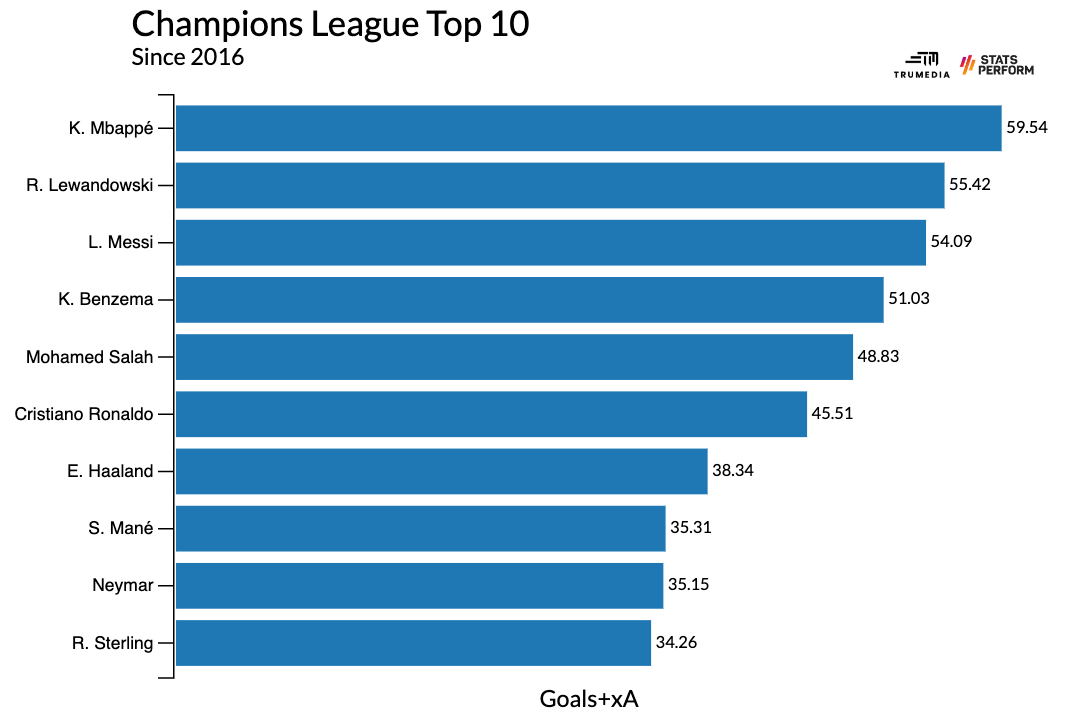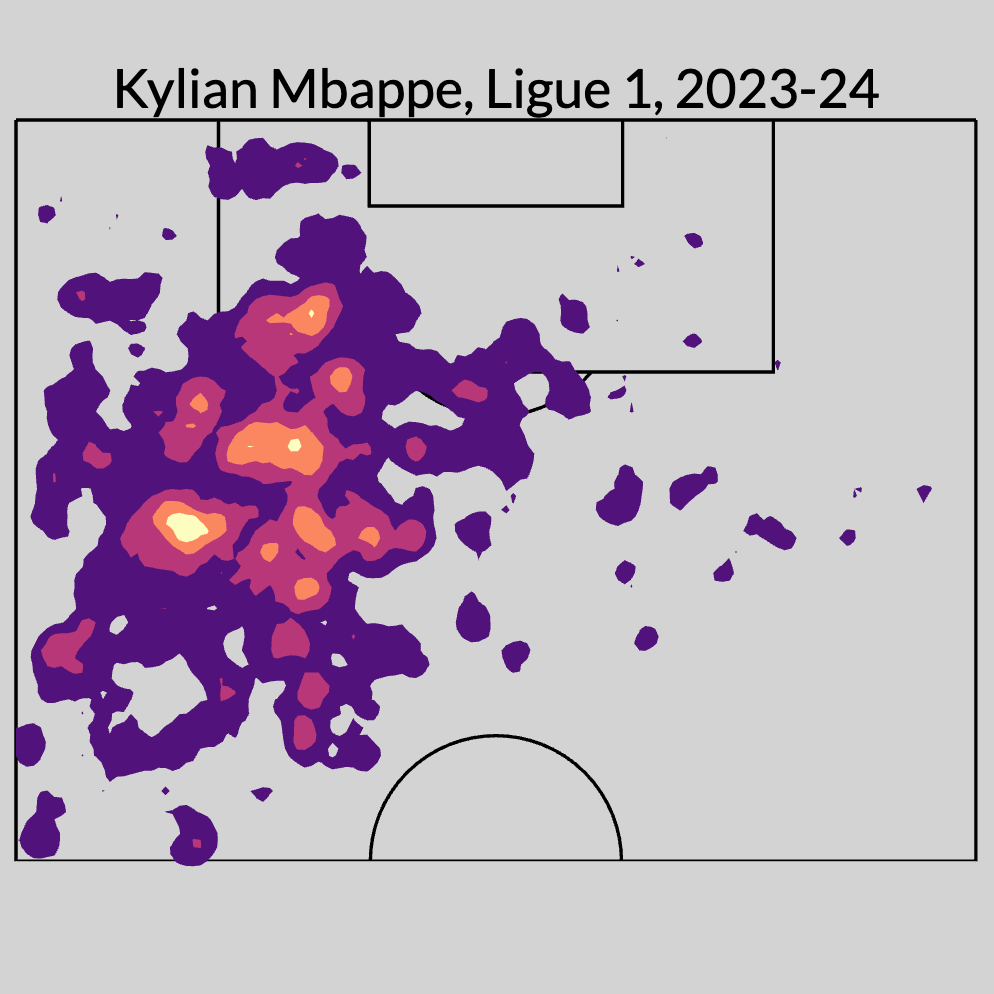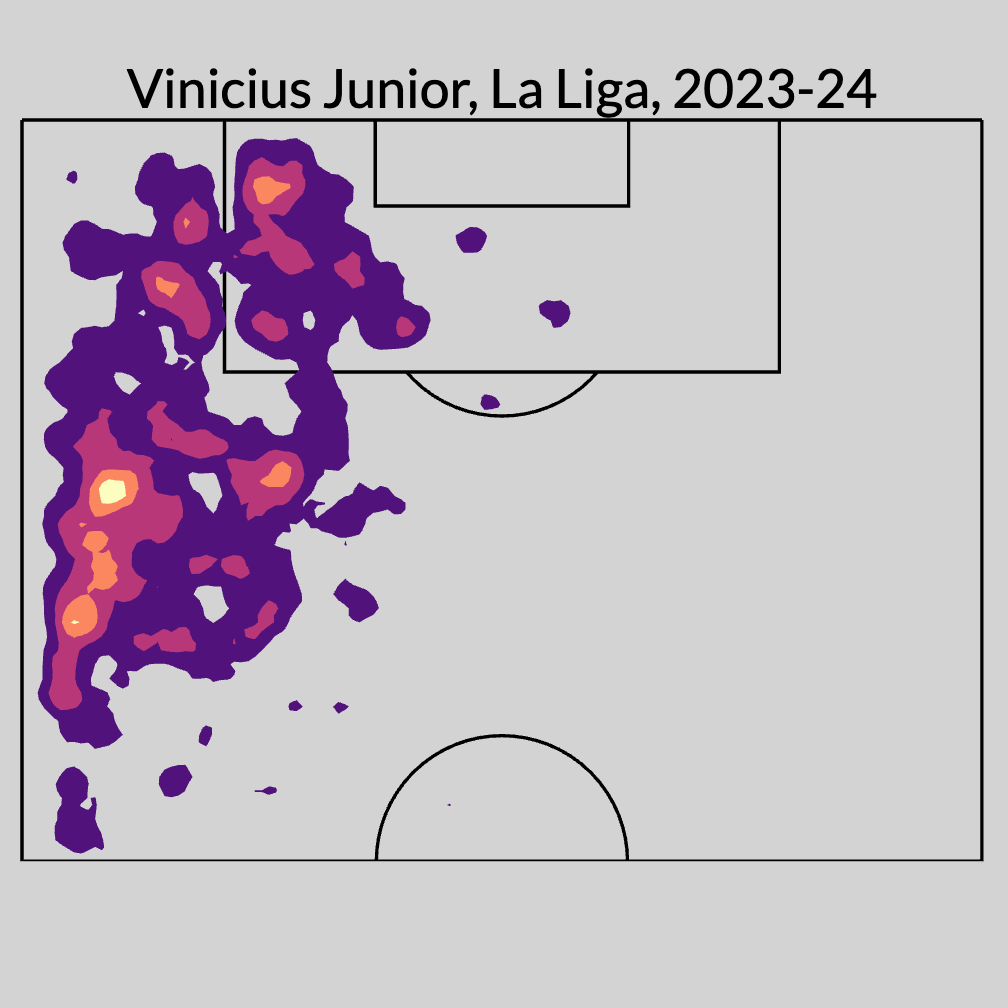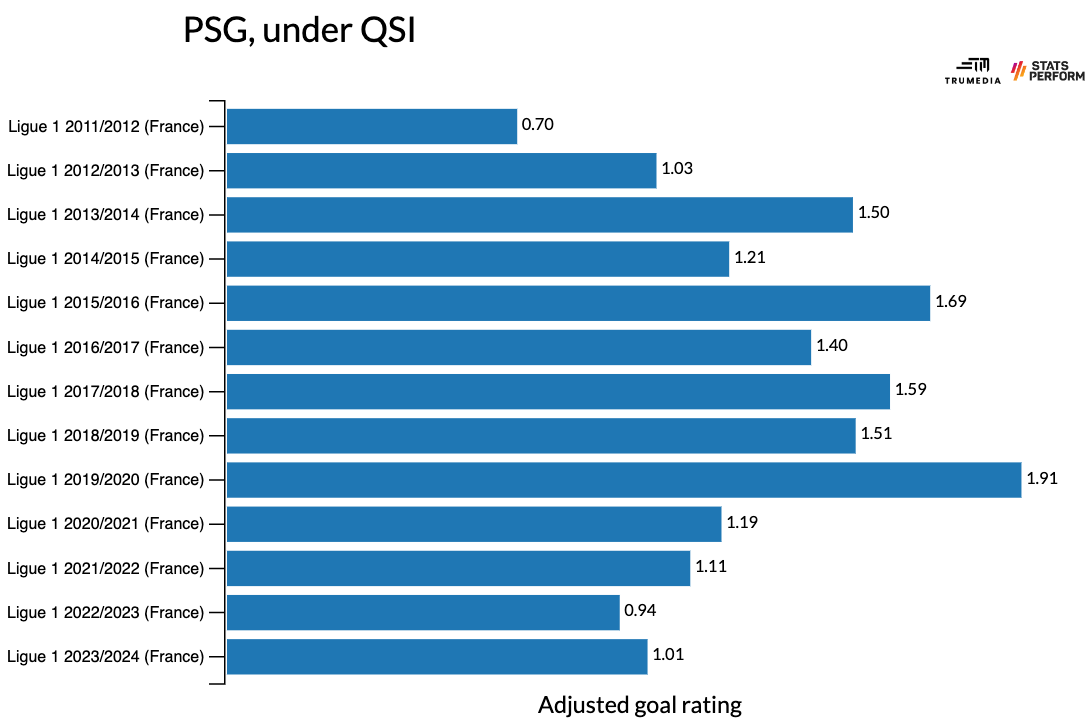We probably still shouldn't believe it until we see him attempting to juggle a commemorative soccer ball in front of the media and fans at the Santiago Bernabeu, but it seems like it finally happened. Kylian Mbappé has signed with Real Madrid, the club announced on Monday.
Thus ends nearly a half-decade of coy will-he-won't-he between Mbappé, Real Madrid president Florentino Perez, a succession of Paris Saint-Germain managers, every French player on Real Madrid, PSG president Nasser Al-Khelaifi, and even the French prime minister, Emmanuel Macron.
While it's normal to feel worn down by this saga -- as well as a resignation at the inevitability of Real Madrid signing the best soccer player in the world -- this is still quite rare. The best soccer player in the world rarely changes teams because whatever team is employing the best soccer player in the world (A) wants to keep said player, and (B) likely has enough money to continue employing said player.
The last time the best player in the world changed teams was maybe Lionel Messi, who moved from Barcelona to Paris Saint-Germain in the summer of 2021, thanks to Barca's incredible financial incompetence. But Messi was already 34 years old at that point. The last time the best player in the world changed teams in his prime arguably was when Cristiano Ronaldo went from Manchester United to Real Madrid in 2009, or more likely when the Brazilian Ronaldo changed from Inter Milan to Real Madrid in 2002.
Sensing a theme here? On the rare occasion a young, established, worldwide superstar switches teams, he tends to join Real Madrid. Let's break down the implications for the player, his new club, and his old club.
What it means for Mbappé
Although he's taking a relatively substantial pay cut to leave Paris for Madrid, he might finally win the Ballon d'Or.
I don't really ever see a time where PSG exists at the center of European soccer. They have such a massive financial advantage over the rest of the French league that it renders individual and team performance essentially meaningless amid the grander annual narrative of world soccer. Of course PSG wins Ligue 1 -- look at all their money! And of course PSG's attackers score and assist all of those goals -- look at all of their teammates!
In other words, the only way to have a truly meaningful season as a PSG player is to win a World Cup -- see: 2022 -- or to win the Champions League. If you play for Real Madrid or you play in the Premier League, though, your domestic achievements actually take on some weight.
To be clear, domestic league performance should matter -- the Champions League is a pretty random set of no more than 13 games, where nobody plays the same schedule. The club season has the same schedule for everybody, and there's no luck of the draw. The best teams and best players after 38 games are the best teams and best players.
Now, for all of the farmer's league critics out there: We shouldn't have any doubt that Mbappé will light up LaLiga. One way that I like to look at player performance is to combine goals with expected assists. If you score a goal, you're getting on the end of the chance and you're converting it, but expected assists award you solely for the quality of your pass, without worrying over whether your teammate converted it.
Since 2016, here are the Champions League leaders in non-penalty goals plus expected assists:

The fascinating thing is that Mbappé did most of that before what are theoretically going to be his prime years, between the ages of 24 and 28. He'll be only 25 at the beginning of next season.
What it means for Real Madrid
So, is it as simple as that? The best player in the world is joining what's already the best team in the world? A side that's already filled with other stars currently in their mid-to-early-20s? A team that's only really missing a go-to goal scorer?
This shouldn't be complicated ... right?
While I do think we tend to unnecessarily complicate this and every other sport -- the best players win games, and you win more games by acquiring better players -- there is a kind of diminishing returns here. Bear with me for second: If you could clone prime Lionel Messi, you'd win more games, but how many times would you want to clone him? Would a team of 11 Messis be better than a team of, say, three Messis, supported by other players who cover up the weaknesses and deficiencies of their trio of superstar clones? While I would pay money to see the former function, my instinct is that the latter would be the more effective team.
So, will Real Madrid be able to find the right balance with Mbappé in the team? Per FBref's similar-player algorithm, the most similar player to Mbappé is Vinícius Júnior; the second-most similar is Rodrygo. Or: the two players he'll be sharing a front line with at Real Madrid.
This isn't a bad thing, necessarily. Ian Graham, former head of research at Liverpool and one of the masterminds behind the signings of Mohamed Salah, Roberto Firmino and Sadio Mané, has told me that the team purposefully targeted attacking players with diverse and overlapping skill sets. This made Liverpool's attacking movements more fluid and unpredictable -- all three players could execute any fundamental decision (dribble, pass, shoot) in any situation.
In Mbappé, Vinícius Júnior and Rodrygo, all three players are fantastic dribblers and shot-getters. None of them are world-class passers, but they've all shown the capacity to create quality shots for their teammates because of how good they all are at getting into dangerous areas. Amid the loose positional guidelines implemented by Real Madrid coach Carlo Ancelotti -- he more or less trusts his attackers to figure it out -- this could and probably should be a devastating trio.
From an attacking perspective, the concern would be that Mbappé and Vinicius tend to favor the same areas of the field.
Here's the heat map for Mbappé's touches:

And here are Vinícius Júnior's touches:

In the past, Mbappé has expressed a preference for playing off of a target striker, but there aren't many target strikers at the top level of the sport these days -- and there certainly aren't any who are more effective players than Rodrygo and Vinícius. So, they'll have to figure it out.
The real question: how this will work without the ball? Although he's only 25, Mbappé has already stopped defending. This usually doesn't happen until an attacker's later years, but he almost never pressures the ball. Among all forwards who have played at least 900 minutes across Europe's Big Five leagues this season, Mbappé ranks 318th in combined tackles+interceptions per every 1,000 opponent touches. Rodrygo ranks 212th, and Vinicius sits at 185th.
And it's not like being an effective attacker means you can't defend. The likes of Lamine Yamal, Bradley Barcola, Jamal Musiala, Jérémy Doku, Bukayo Saka, Diogo Jota, Gabriel Jesus, Goncalo Ramos, Raphinha, Cody Gakpo and Khvicha Kvaratskhelia all rank in the top 40 for adjusted tackles+interceptions.
Real Madrid were able to survive the lack of resistance provided by their forward line this season because it was typically backed up by four midfielders. Jude Bellingham basically played as a No. 10 with license to break into the box at will, and while his defensive contribution is somewhat light for a traditional midfielder in a midfield three, it's quite strong for an attacking midfielder. Madrid were able to survive the second-highest opponent pass completion in LaLiga because they frequently had eight players behind the attackers who could defend.
Now, you're swapping arguably the least active defender in the world for one of Real Madrid's midfielders. It won't be Bellingham, so it'll likely be for the retiring Toni Kroos, who was the least active of Madrid's midfielders. Perhaps Mbappé-for-Kroos doesn't make much of a difference. However, most of Madrid's defenders will be another year deeper into their 30s in a season where they'll likely have to do even more defending than they did this season.
I'd bet on Madrid figuring it out -- Ancelotti found a way to play James Rodríguez with Cristiano Ronaldo, Karim Benzema and Gareth Bale -- but they're certainly pushing the limits of talent concentration.
What it means for PSG
This is a new era for PSG -- and not just in a "post-Mbappé" sense.
Ever since Qatar Sports Investments took over PSG in 2011, they've pretty much always had at least one superstar in the roster. In 2012, they added Zlatan Ibrahimovic and David Beckham. The likes of Thiago Silva, Edinson Cavani, David Luiz and Ángel Di María weren't superstars (though they were globally recognized greats), while the likes of Marquinhos and Marco Verratti developed into that same level of player after joining the club at a young age.
In 2016-17, there was a brief pause, when Ibrahimovic went to the Los Angeles Galaxy. Cavani, Di María, Thiago Silva, Marquinhos and Verratti were all established world-class players, but the team lacked a true headline star. That season, they lost their first league title since QSI took over, and they were embarrassed by Barcelona in the Champions League, coughing up a 4-0 first-leg lead after losing in Spain, 6-1.
How to ensure that never happens again? Well, they went out and acquired the mastermind of Barcelona's 6-1 comeback, Neymar, and also signed Mbappé, the best player on the Monaco team that beat them to the Ligue 1 title.
Rodrigo Faez discusses Kylian Mbappe's imminent arrival at Real Madrid and what it means for him as a player and the club.
The Neymar move seemed to herald in a new era in European soccer. Superstars in their primes never left Barcelona. But when PSG paid the player's full buyout fee -- €222 million, more than double the previous world-record fee -- they had no choice. If PSG could do this and scoop up Mbappé, the best teenager the sport had seen since Neymar, what would stop them from doing this to every other team's best player?
A couple years later, legendary Italian goalkeeper Gianluigi Buffon joined the club and then, as Barcelona's finances spiraled out of control during the pandemic, PSG were the only club who could afford the salary of the best player in the world. The same summer that Lionel Messi joined, so too did perhaps the most famous defender in the world, Sergio Ramos, and goalkeeper Gianluigi Donnarumma, who was coming off of a Euro-winning star turn for Italy.
Fast forward to today, and Marquinhos and Donnarumma are the only players of those mentioned that still with the team. According to the crowd-sourced player valuations at the site Transfermarkt, PSG do not employ any of the 50 most valuable players in the world. This is a team that had a payroll of about $395 million (per estimates from the site FBref) just last season, which was nearly $80 million more than any other club in the world.
So what now? The biggest club in France and the richest club in the world just lost arguably the greatest French player of all time, a Paris-born 25-year-old, to the old money of Real Madrid. It turns out PSG haven't flipped European soccer on its head -- they just threw it off balance for a couple years.
QSI's stated goal for the club is to win the Champions League, and they've still only reached one final since 2011 and just two other semis. While they're coming off of another semifinal appearance this season, much of that comes down to a cushy draw that saw the four favorites -- Manchester City, Arsenal, Real Madrid and Bayern Munich -- drawn together on the opposite side of the bracket.
As far as it's worth measuring PSG's domestic league performance, this was actually one of their worst seasons yet. The best future-looking metric is a blend of expected goals (70%) and actual goals (30%). We'll call it "adjusted goal rating," and here's how all of the QSI seasons stack up against each other:

Not totally coincidentally, that standout season of 2019-20 was the same one that they made it to the Champions League final.
If this past year was a down year and then the team just lost arguably the best soccer player in the world, what might come next? After Messi and Neymar left the club, it at least seemed like PSG had begun to build a team around Mbappé. They'd begun signing younger, unspectacular players who compliment him and fill in the gaps behind him. The talent distribution really doesn't matter at all for winning Ligue 1, but these star-laden teams frequently fell apart in the Champions League when they came up against the constant pressure provided by the other top clubs in the world, who all had stars of their own but also had cohesive tactical systems.
Stars beat systems, but a system with stars is going to beat stars without a system. PSG have almost actively downgraded their overall talent level in order for manager Luis Enrique to implement a possession-heavy, we-almost-literally-never-cross-the-ball approach. But the system still had Mbappé at the top of it, scoring 35 goals across Ligue 1 and the Champions League.
I certainly buy the argument that it's easier to build a system without Mbappé -- there are lots of other young, prolific attackers whose presence won't make it impossible for you to press aggressively, but that's more of a question for Real Madrid, who already have perhaps the most talented squad in world soccer. PSG, though, seemed to be building a team that worked for Mbappé, who accounted for more than double the expected goals and assists of anyone else on the team in the Champions League. And now he's gone.
And it's not clear who might be best to replace him. There isn't a young, readymade superstar out there who PSG could easily acquire. There are ready-made superstars who it would be really hard to acquire -- say, Erling Haaland or even Bukayo Saka -- or not-quite-superstars like Napoli's Victor Osimhen and Inter Milan's Lautaro Martínez who won't be clear needle-movers.
Were I PSG, or any other big club, I'd look at Napoli's 23-year-old winger Khvicha Kvaratskhelia, who doesn't have the star power, but seems undervalued because of Napoli's struggles after winning the title last season. The Georgian was just as good, if not better, as last season, and he's only just entering his peak years.
Whatever direction they go, though, the era of PSG signing aging-and-or-wantaway superstars seems like it's over -- both because they want it to be and because the players just aren't out there. In terms of building a coherent team, that's probably for the best. Whatever comes next, then, will require long-term planning and patience, two ideas that no one has ever associated with PSG.
